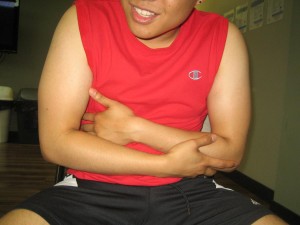It is important to note that food poisoning caused by cottage cheese is likely to occur if the individual has eaten cottage cheese that is already sour. Dairy products have a certain shelf-life before they spoil and this will eventually allow harmful bacteria to grow which produces toxins.
Once the individual eats cottage cheese that is contaminated with infectious organisms, it will infect the lining of the digestive tract and trigger the development of adverse reactions in the body. It is best to consult a doctor once the initial signs of food poisoning occur in order to determine the precise cause and the appropriate measures to take. You can manage the symptoms of food poisoning by enrolling in a first aid class today.
What are the possible causes of food poisoning due to cottage cheese?
Food poisoning caused by eating cottage cheese can occur once cottage cheese is already contaminated. Always bear in mind that cottage cheese can become contaminated during the manufacturing process or due to incorrect handling of food. If the equipment used in creating cottage cheese becomes contaminated, cottage cheese can contain infectious organisms. The cheese can also become infected if the individual does not wash hands properly or the utensils used. Eating cottage cheese that is way past its sale date also poses as a risk for food poisoning.
Symptoms of cottage cheese food poisoning?

The indications that an individual has eaten contaminated cottage cheese develop within 4-36 hours after ingesting cheese. The usual symptoms include fatigue, fever, vomiting and loss of appetite, abdominal pain, watery diarrhea, nausea as well as abdominal cramps. The body will attempt to eliminate the infectious organism. Vomiting and diarrhea can eventually lead to dehydration which can cause further complications. The indications of dehydration include lightheadedness, dry mouth, flushed skin and dry skin. It is best to consult a doctor right away if you believe that an individual is dehydrated.
Treatment
Food poisoning caused by cottage cheese is treated by discarding the remaining contaminated cottage cheese, modifying the diet and increasing the intake of fluids. The main objective of the treatment is to restore the body with fluids and promote normal bowel movements. The individual should also eat bland foods such as potatoes, bananas, skinless chicken, cooked carrots, toast and rice. It is also important to drink clear liquids such as water, sports drinks and herbal teas. Beverages that are high in sugar as well as those that contain caffeine and alcohol must be avoided.
Important considerations to bear in mind
Do not attempt to diagnose the condition. The symptoms of food poisoning are strikingly similar to other digestive symptoms such as milk allergy or lactose intolerance. If the individual develops the usual food poisoning symptoms once cottage cheese is eaten, it is most likely due to another health condition. The doctor can easily diagnose the condition with tests using the stool.
